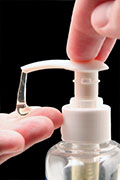- Are You Making This Expensive Thermostat Error This Winter?
- Recognizing the Signs of Hypothyroidism
- 10 Strategies to Overcome Insomnia
- Could Artificial Sweeteners Be Aging the Brain Faster?
- Techniques for Soothing Your Nervous System
- Does the Water in Your House Smell Funny? Here’s Why
- Can a Daily Dose of Apple Cider Vinegar Actually Aid Weight Loss?
- 6 Health Beverages That Can Actually Spike Your Blood Sugar
- Treatment Options for Social Anxiety Disorder
- Understanding the Connection Between Anxiety and Depression
Rashes From Wipes, Liquid Soaps on the Rise


Allergic skin reactions to a preservative used in pre-moistened wipes and liquid soaps are on the increase, a doctor says.
“In the last two or three years, we’ve suddenly seen a big increase in people with this type of allergy,” Dr. Matthew Zirwas, director of the contact dermatitis center at Ohio State University’s Wexner Medical Center, said in a center news release. “For some patients, their rash has been unexplained and going on for years.”
The chemical preservative, methylisothiazolinone, is found in many water-based products, including pre-moistened wipes, cosmetics, liquid soaps, hair products, sunscreen, and laundry and cleaning products.
“Concentrations of the preservative have increased dramatically in some products in the last few years, as manufacturers stopped using other preservatives like paraben and formaldehyde,” Zirwas said.
The preservative can cause an itchy, painful rash that can include blisters and resembles a reaction to poison ivy. Areas of the body most often affected by an allergic reaction to methylisothiazolinone include: the buttocks and genitals from using moistened flushable wipes; the fingers and hands from handling the wipes; and the face from using soaps and shampoos.
“If someone suspects an allergy to moistened wipes, they need to stop using them for at least one month,” Zirwas said. “A week or two isn’t enough time.”
He added that manufacturers are aware of the problem and are trying to develop alternative preservatives.
More information
The American Academy of Allergy, Asthma and Immunology has more about allergic skin reactions.
Source: HealthDay
Copyright © 2026 HealthDay. All rights reserved.










